
Journal of Siberian Federal University-Chemistry
Scope & Guideline
Advancing Chemistry Through Innovative Research.
Introduction
Aims and Scopes
- Material Science and Engineering:
The journal features research on the synthesis and characterization of novel materials, including polymers, ceramics, and composites, with applications in various industries. - Catalytic Processes and Reaction Engineering:
A significant portion of the journal's content is dedicated to studies on catalytic processes, optimization of reaction conditions, and the development of new catalysts for chemical reactions. - Environmental Chemistry and Green Chemistry:
Research addressing environmental concerns, including waste management, pollution remediation, and the development of sustainable chemical processes, is a core focus area. - Analytical Chemistry and Characterization Techniques:
The journal publishes studies that advance analytical techniques for chemical analysis, including spectroscopic methods, chromatography, and electrochemical analysis. - Biochemistry and Biomaterials:
The integration of chemistry with biological systems is represented, highlighting research on biomaterials, drug delivery systems, and the synthesis of biologically active compounds.
Trending and Emerging
- Sustainable and Green Chemistry Practices:
There is a marked increase in publications focusing on environmentally friendly methodologies, including the use of renewable resources and reduction of hazardous substances in chemical processes. - Nanotechnology and Nanomaterials:
Research on nanomaterials, including their synthesis, characterization, and applications in various fields such as medicine and environmental science, is rapidly gaining traction. - Electrochemical Methods and Energy Storage:
Emerging themes include studies on electrochemical processes, particularly in energy storage systems like batteries and supercapacitors, reflecting a growing interest in sustainable energy solutions. - Biomaterials and Biocompatible Polymers:
The journal is increasingly featuring research on biomaterials that interact with biological systems, focusing on drug delivery, tissue engineering, and biocompatibility. - Advanced Characterization Techniques:
There is a rising trend in the use of sophisticated analytical techniques, such as high-resolution spectroscopy and advanced microscopy, to characterize materials and understand their properties better.
Declining or Waning
- Traditional Inorganic Chemistry Studies:
Research focusing solely on classical inorganic chemistry, without application to materials science or catalysis, appears to be waning as interdisciplinary approaches gain prominence. - Basic Organic Synthesis:
While organic synthesis remains important, the trend shows a decline in publications centered on basic methodologies without links to practical applications or advanced materials. - Studies on Conventional Solvents in Chemical Processes:
Investigations utilizing traditional solvents without consideration for green chemistry principles have decreased, indicating a shift towards more sustainable practices.
Similar Journals

CHEMICAL JOURNAL OF CHINESE UNIVERSITIES-CHINESE
Catalyzing Collaboration Among Chemists.CHEMICAL JOURNAL OF CHINESE UNIVERSITIES-CHINESE, published by Higher Education Press, serves as a vital platform for advancing research in the field of chemistry. With a history dating back to 1996, this journal has evolved to encompass a wide range of topics fundamental to the chemistry community, catering to both applied and theoretical perspectives. Although classified in Quartile 4 within the broader chemistry category, it remains a significant contributor to the knowledge base, ranking 281st out of 408 journals in the general chemistry category according to Scopus. Positioned in Beijing, China, the journal aims to foster collaboration among researchers and professionals while disseminating innovative research and developments. By promoting open exchange of ideas in chemistry, it strives to elevate the scholarly dialogue and contribute to ongoing education for students and professionals alike, with its content accessible through institutional subscriptions.

Chemical Methodologies
Bridging Theory and Practice in ChemistryWelcome to Chemical Methodologies, a premier journal published by SAMI PUBLISHING CO-SPC, dedicated to advancing the field of chemistry through innovative research and methodologies. With an ISSN of 2645-7776 and an E-ISSN of 2588-4344, this journal provides a vital platform for researchers and scholars to share their findings in areas encompassing physical, theoretical, and organic chemistry. Despite its initial HIndex and quartile rankings still being established, the journal's evolving impact within the academic landscape is underscored by its Scopus Ranks, which place it in the 35th percentile for physical and theoretical chemistry and the 33rd percentile for organic chemistry. Since its inception in 2022, and continuing through 2024, Chemical Methodologies aims to foster collaboration and knowledge dissemination among academics and practitioners alike, bridging theoretical concepts and practical applications. This open-access platform enhances accessibility for researchers and students worldwide, ensuring that groundbreaking contributions to chemical science reach a broad audience.
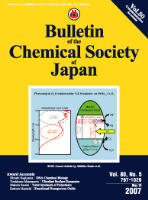
BULLETIN OF THE CHEMICAL SOCIETY OF JAPAN
Advancing Chemistry: Bridging Research and InnovationBULLETIN OF THE CHEMICAL SOCIETY OF JAPAN, published by the esteemed Chemical Society of Japan, serves as a pivotal platform for the dissemination of cutting-edge research in the multifaceted field of chemistry. With an ISSN of 0009-2673 and an E-ISSN of 1348-0634, this journal has been integral in fostering the growth of chemical sciences globally since its inception in 1965. The journal holds an impressive Q2 ranking in the Chemistry (miscellaneous) category, indicating its relevance and influence within the academic community, as reflected by its Scopus rank of #104/408, placing it in the 74th percentile. Although it is not an open-access journal, its rich content, which spans a wide range of topics in general chemistry, remains highly valued by researchers, professionals, and students alike, affirming its crucial role in advancing both theoretical knowledge and practical applications in chemistry. As it converges towards 2024, the bulletin continues to uphold its commitment to excellence in scientific communication and research dissemination in Japan and beyond.

Journal of Chemistry and Technologies
Connecting Ideas, Transforming Technologies.The Journal of Chemistry and Technologies, published by OLES HONCHAR DNIPROPETROVSK NATIONAL UNIVERSITY, is an open access journal dedicated to advancing knowledge in the broad fields of chemistry and chemical engineering since its inception in 2013. With ISSN 2663-2934 and E-ISSN 2663-2942, this journal provides a vital platform for researchers and professionals, particularly in Ukraine and beyond, to share innovative research findings and contemporary technological advancements. Currently ranked in the Q4 quartile in both Chemical Engineering and General Chemistry for 2023, it serves as an enriching resource for those interested in emerging trends and interdisciplinary studies within these domains. The journal adheres to high academic standards while fostering collaboration in the scientific community by offering open access articles that ensure visibility and accessibility to a global audience. As an important part of the academic landscape, the Journal of Chemistry and Technologies aims to inspire future research and development, paving the way for new discoveries and applications in chemistry-related fields.
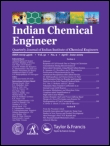
Indian Chemical Engineer
Exploring the Depths of Chemical Research.Indian Chemical Engineer, published by Taylor & Francis Ltd, stands as a reputable journal in the field of chemical engineering, encompassing a wide range of topics pertinent to both academia and industry. With an ISSN of 0019-4506 and an E-ISSN of 0975-007X, this journal has been a key resource for researchers and professionals since its inception in 1992, undergoing a significant evolution from 2009 to 2024. Currently ranked in the Q3 category of chemical engineering (miscellaneous) in 2023, it reflects a dedicated commitment to disseminating innovative research and insights within the discipline. The journal is indexed in Scopus, achieving a rank of 148 out of 273, which denotes its growing influence in the field with a 45th percentile placement. Although currently not an open-access publication, it offers valuable content that contributes extensively to the advancement of chemical engineering research and education. Researchers, professionals, and students alike are encouraged to engage with this publication to stay at the forefront of industry advancements and academic discussions.
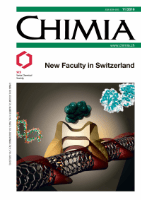
CHIMIA
Unlocking Insights, Shaping the Future of Science.CHIMIA, published by the esteemed Swiss Chemical Society, is a premier journal that has been contributing to the fields of chemistry and medicine since its inception in 1947. With an ISSN of 0009-4293 and a commitment to advancing scientific knowledge, CHIMIA transitioned to Open Access in 2020, enhancing the accessibility of its high-quality research articles. Situated in Switzerland, the journal embraces a diverse scope, bridging various disciplines within the realms of chemistry and its intersection with medicine. As of 2023, it holds a respectable Q3 ranking in both Chemistry (miscellaneous) and Medicine (miscellaneous), reflecting its growing impact within the scientific community. Researchers, professionals, and students alike will find CHIMIA an invaluable resource as it publishes insightful findings, reviews, and discussions that stimulate innovation and dialogue in these dynamic fields.
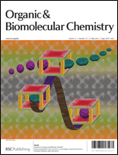
ORGANIC & BIOMOLECULAR CHEMISTRY
Unveiling the complexities of biochemistry and organic chemistry.ORGANIC & BIOMOLECULAR CHEMISTRY is a prestigious academic journal published by the Royal Society of Chemistry, dedicated to advancing the fields of organic and biomolecular chemistry. With its ISSN of 1477-0520 and E-ISSN of 1477-0539, this journal plays a pivotal role in disseminating high-quality research and contributing to the scientific community, particularly in biochemistry, organic chemistry, and physical and theoretical chemistry. Currently ranked in the third quartile for Biochemistry and the second quartile for Organic Chemistry and Physical and Theoretical Chemistry, it caters to a diverse audience of researchers, professionals, and students who seek insightful studies and reviews. With a publication history spanning since 2003 and ongoing till 2024, the journal fosters open access to its articles, encouraging the free exchange of knowledge. Situated in the vibrant academic environment of Cambridge, UK, ORGANIC & BIOMOLECULAR CHEMISTRY serves as a vital resource for innovative research at the intersection of chemical sciences.
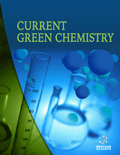
Current Green Chemistry
Unveiling the future of chemistry with eco-friendly insights.Current Green Chemistry, published by Bentham Science Publishers, is a pivotal scholarly resource devoted to advancing the field of green chemistry. With ISSN 2213-3461 and E-ISSN 2213-347X, this journal serves as a crucial platform for researchers and professionals to explore innovative and sustainable practices within the chemical sciences. The journal has demonstrated significant recognition, evidenced by its categorization in the third quartile (Q3) across various specializations including Analytical Chemistry and Inorganic Chemistry, and even a fourth quartile (Q4) in Organic Chemistry, according to the latest Scopus metrics. This indicates a growing influence in relevant fields, making it a valuable reference for contemporary environmental initiatives. The journal's accessible nature, although not open access, ensures researchers can still engage with high-quality, peer-reviewed content. Spanning an impressive converged period from 2019 to 2024, Current Green Chemistry is committed to enhancing the visibility of groundbreaking research that aligns with sustainable development objectives, making it an essential resource for anyone interested in the future of chemistry.

RUSSIAN JOURNAL OF APPLIED CHEMISTRY
Advancing the Frontiers of Applied ChemistryRUSSIAN JOURNAL OF APPLIED CHEMISTRY, published by PLEIADES PUBLISHING INC, serves as a pivotal platform for advancing knowledge in the fields of chemical engineering and general chemistry. With an ISSN of 1070-4272 and an E-ISSN of 1608-3296, this journal has been in continuous publication since 1995 and is set to continue until 2024. Although it operates without an open access model, researchers can access a wealth of innovative research findings, critical reviews, and insightful discussions that reflect the current trends and challenges in applied chemistry. Its rankings place it in Q3 quartiles for both Chemical Engineering and Chemistry as of 2023, indicating its emerging influence within these disciplines. The Scopus rankings further highlight its relevance, positioning it in the lower percentiles, suggesting a fertile ground for researchers aiming to elevate the field. Engaging with this journal can enrich academic and professional understanding, making it an essential resource for anyone dedicated to furthering their expertise in applied chemistry.
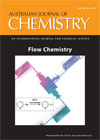
AUSTRALIAN JOURNAL OF CHEMISTRY
Bridging theory and practice for a sustainable future.The Australian Journal of Chemistry, with an ISSN of 0004-9425 and an E-ISSN of 1445-0038, is a distinguished publication from CSIRO PUBLISHING, dedicated to advancing the field of chemistry since its inception in 1948. Based in Australia, this journal serves as a platform for original research articles, reviews, and innovative studies that encompass a wide spectrum of chemical disciplines, aiming to foster communication and collaboration among researchers globally. Despite its Q3 ranking in the Chemistry (Miscellaneous) category and standing at rank #236 in Scopus’ general chemistry classification, it remains an essential resource for professionals and students seeking to stay informed about emerging trends and discoveries in chemistry. The journal does not offer open access, emphasizing the premium quality of peer-reviewed content that adheres to rigorous academic standards. By bridging theory and practice, the Australian Journal of Chemistry continues to play a crucial role in shaping the future of chemical sciences.